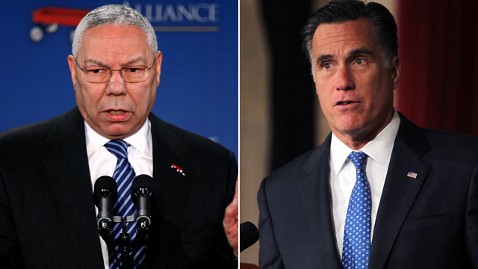Why Colin Powell Bashed Mitt Romney's Foreign-Policy Advisers
Colin Powell on Wednesday criticized Mitt Romney's foreign-policy sensibility - more specifically, his advisers and his thoughts on Russia - and in doing so, the former secretary of state resurfaced old conflicts with the Republican candidate's team.
"C'mon Mitt, think," Powell said of Romney's recent statement that Russia is America's "number-one geopolitical foe." Powell cautioned Romney against listening too closely to his advisers, some of whom are "quite far to the right" in his esteem, and Powell hinted that, perhaps, the candidate was being influenced by some dangerous ideas.
Appearing on MSNBC's "Morning Joe," Powell was asked about Romney's largely neoconservative team. His full response is below:
SCARBOROUGH: Are you concerned with the foreign-policy advisers that Mitt Romney surrounded himself with, that there aren't enough sergeants, and there aren't enough people with on the ground experience and that we seem to have yet another Republican candidate who is sort of top heavy when it comes to neoconservatives around him?
POWELL: I've noticed that. I don't know who all of his advisers are, but I've seen some of the names, and some of them are quite far to the right, and sometimes they, I think, might be in a position to make judgments or recommendations to the candidate that should get a second thought. For example, when governor Romney not too long ago said, you know, the Russian Federation is our number-one geostrategic threat. Well, c'mon Mitt, think. It isn't the case. And I don't know whether Mitt really feels that, or, whether it was …
BRZEZINSKI: Or whether someone told him to say it?
POWELL: I don't know, you ask him. … I mean, it's been catching a lot of heck from the more regular GOP foreign-affairs community. We're kind of taken aback by it. How could you … look at the world? There is no pure competitor to the United States of America.
Romney keeps a large cadre of foreign-policy advisers, eight of whom were at the vanguard of neoconservative foreign-policy thinking as participants in the Project for a New American Century think tank, founded in 1997 and headed by William Kristol, the Nation's Ari Berman reported this month.
There are two names that likely stand out for Powell.
During his tenure as president George W. Bush's secretary of State, Powell found himself at odds with neoconservatives in the administration, at least one of whom advises Romney. Though he is not listed as an official member of Romney's foreign-policy and national-security advisory team, former U.N. ambassador and prominent neoconservative John Bolton has been identified in media reports as an influential policy voice in Romney's circle.
During Bolton's 2005 Senate confirmation, anonymous sources informed the Washington Post that Bolton had prevented a 2003 memo, on international support for U.S.-backed investigation of Iran's nuclear program, from reaching Powell's desk. Powell, meanwhile, privately urged Republican senators to vote Bolton down. Romney's advisers aren't exclusively neocons, but Bolton leads a faction with which Romney usually sides, the New York Times' David Sanger reported this month.
Romney's team also includes Robert Kagan, another prominent neocon and Project for the New American Century member who urged George W. Bush not to appoint Powell to head the State Department, in a 2000 Washington Post op-ed.
"Powell's judgment at this historic juncture was dreadful. Had Bush followed his advice, Saddam would now be dominant in the Middle East and a potent figure on the world stage," Kagan wrote, denouncing Powell for his "broad doctrine of noninterventionism" and labeling Powell as wrongly reticent at the first Iraq invasion.
"The problem with Powell is his political and strategic judgment," Kagan wrote. "He doesn't believe the United States should enter conflicts without strong public support, but he also doesn't believe the public will support anything. That kind of iron logic rules out almost every conceivable post-Cold War intervention."
Romney himself has carved out a hawkish foreign-policy identity since his 2008 run for president, when he deployed an aggressive national-security platform and forceful pro-Iraq War rhetoric. During that campaign, Romney recruited as a top military adviser Brigadier General (ret.) James "Spider" Marks, who had been integral in strategic and tactical planning before the 2003 Iraq invasion. In 2008, the New York Times named Marks among a group of military experts who offered pro-administration opinions as cable-news analysts, while still maintaining government ties.
Since then, Romney has further displayed his firm line of thinking, and burnished his hawkish image, in his 2010 book "No Apology: The Case for American Greatness."
Not everyone on Romney's team is a staunch Powell opponent. Powell defended foreign-affairs expert Meghan O'Sullivan, Bob Woodward reported in 2004, after then-Defense secretary Donald Rumsfeld sought to evict her from the Iraq War planning process. Vin Weber, a former congressman and Iraq-war booster, defended Powell in 2009 when Rush Limbaugh claimed Powell was no longer a Republican.
But sprinkled as it is with former Bush-administration hands, Iraq-era think-tankers and war-friendly ex-lawmakers, the list undoubtedly reminds Powell of the more difficult times during his stint at the State Department.
